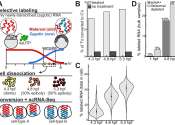'Developmental psychology', also known as human development, is the scientific study of systematic psychological changes that occur in human beings over the course of the life span. Originally concerned with infants and children, the field has expanded to include adolescence and adult development, aging, and the entire life span. This field examines change across a broad range of topics including motor skills and other psycho-physiological processes; cognitive development involving areas such as problem solving, moral understanding, and conceptual understanding; language acquisition; social, personality, and emotional development; and self-concept and identity formation.
Developmental psychology includes issues such as the extent to which development occurs through the gradual accumulation of knowledge versus stage-like development, or the extent to which children are born with innate mental structures versus learning through experience. Many researchers are interested in the interaction between personal characteristics, the individual's behavior, and environmental factors including social context, and their impact on development; others take a more narrowly focused approach.
Developmental psychology informs several applied fields, including: educational psychology, child psychopathology, and forensic developmental psychology. Developmental psychology complements several other basic research fields in psychology including social psychology, cognitive psychology, ecological psychology, and comparative psychology.









